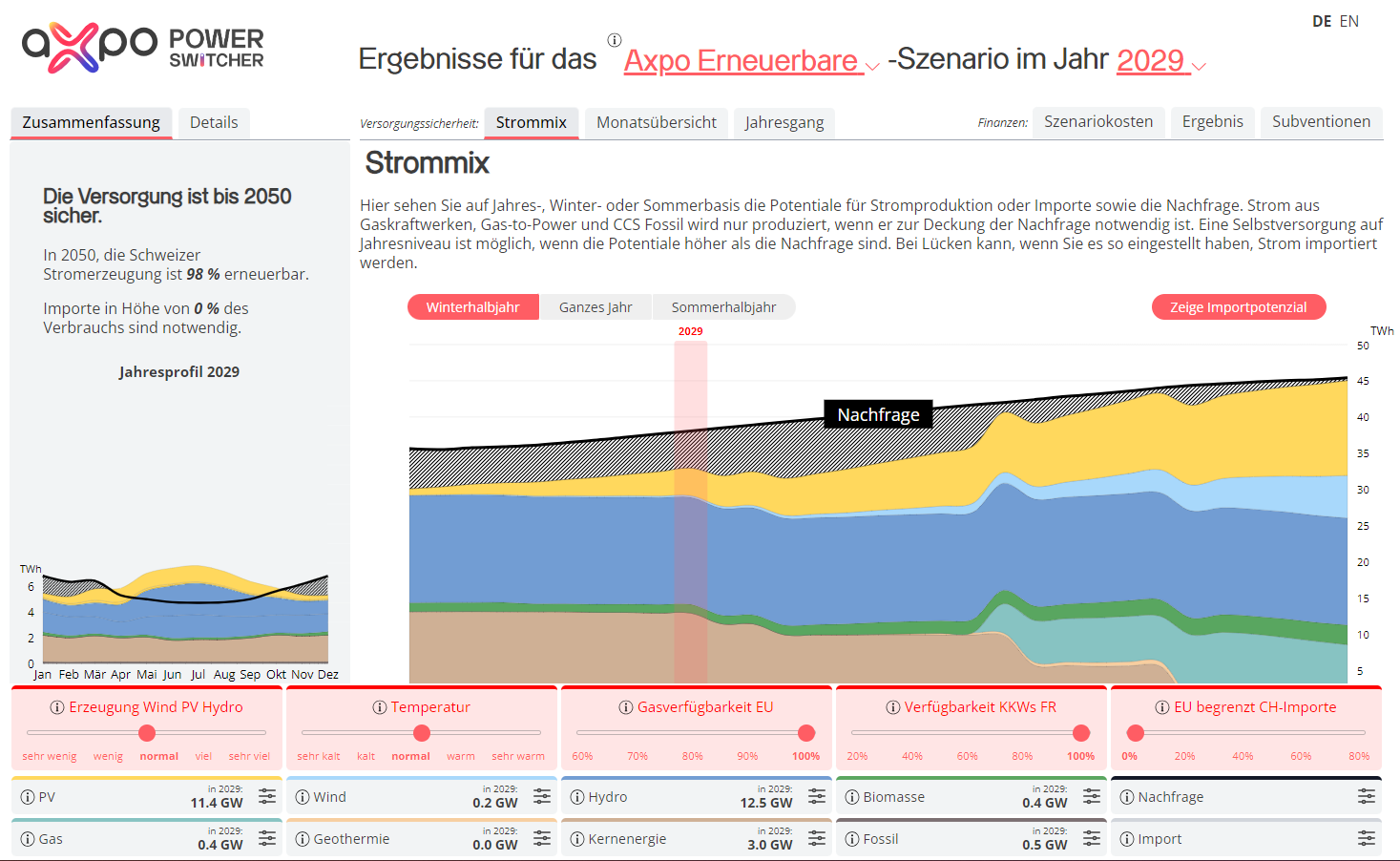‘Yes, but’ to the Federal Council's rescue umbrella
The Federal Council wants to provide a protective mechanism against current systemic risks on the European energy markets. The draft of this rescue mechanism adopted today is better than the first version, which Axpo welcomes. Nevertheless, it still goes too far in parts. The goal must be a lean draft that can effectively mitigate systemic risk with the least possible intervention.
Axpo supports the Federal Council's goal of proactively establishing protection against current systemic risks. While the consultation draft still had considerable deficiencies, substantial improvements can be seen in the version adopted today. Axpo welcomes the reduction of disproportionate reporting obligations for companies. It is also important that some rights and obligations only apply once an application has been submitted. Furthermore, the federal government has recognised that the excessive risk premium is unacceptable.
However, the conditions are still disproportionate. Especially since healthy electricity companies could temporarily make use of the mechanism to protect themselves from possible international chain reactions rather than business mistakes, for example. Also, the limit for system criticality is still arbitrary. The goal must be a lean bill that can effectively mitigate the systemic risk with the least possible intervention.
To achieve this, further improvements need to be made during the legislative process. The rescue umbrella must:
- be open to all electricity companies, irrespective of their legal structure or other criteria;
- ensure that the placement under the rescue umbrella as well as the use of the financial assistance is voluntary;
- calculate the risk premium not on the loan amount but on the interest rate;
- limit the obligation to provide information to that concerning the hedging of electricity trading transactions, starting only from the time of application, and to provide such information only to the authority responsible for granting the financial assistance;
- refrain from any strategic and operational influence by the Confederation (i.e. de facto nationalisation);
Axpo has managed all market distortions and temporary liquidity outflows on its own. Axpo would only make use of the bailout fund as a last resort, for example in the event of a Europe-wide default by business partners.
Hedging electricity production from Swiss plants
Axpo and other electricity companies sell the electricity from their Swiss power plants several years in advance, minimising price risks (so-called ‘hedging’). Their customers, such as SMEs and transmission system operators with many end customers, secure a guaranteed energy supply at a predictable price. Such transactions are usually conducted on energy exchanges. To secure buyers and sellers, regulations require the deposit of cash collaterals. These are returned in full after delivery, at the latest, and are similar to a rental deposit made as security against default by a tenant. The amount of cash collateral depends largely on the price level. If prices rise, so do the collateral requirements. Since the significant increase in gas and electricity prices, further intensified by Russia's war of aggression against Ukraine, the necessary payments have risen to unprecedented levels.
This extraordinary situation in the energy market places enormously high demands on the short-term liquidity of companies. These regulatory exchange requirements are sensible in principle. But when they were introduced, the current situation was inconceivable. Such extreme events could lead to a systemic chain reaction, impacting energy market participants across Europe, including Switzerland, and endangering the security of supply. This could apply in particular during a natural gas embargo, or as a consequence of slowly rising energy prices against the background of a protracted war and continuing sanctions.
The Federal Council's intention to provide a protective mechanism against these systemic risks is understandable. Other European countries, such as Germany, have also created similar draft legislation. The aim of this mechanism should not be to rescue individual companies experiencing difficulties due to bad decision-making. Rather, it should create a safety net against the unforeseeable consequences of regulatory requirements in international energy trading, in which Switzerland is extensively involved.
Learn more about hedging transactions here and the most important facts about electricity hedging here.
- Media Release View Send email Download
Axpo Holding AG
Corporate Communications




.jpg)





